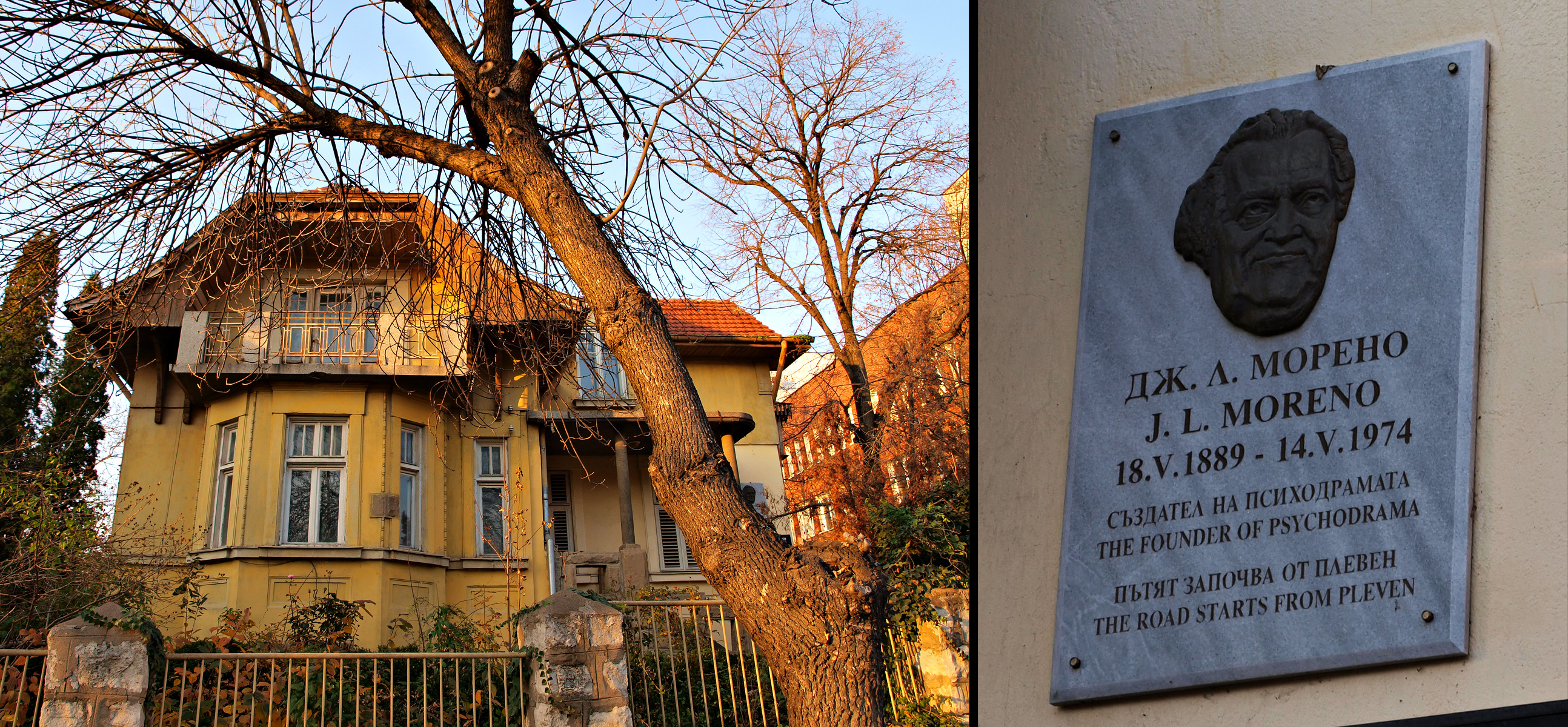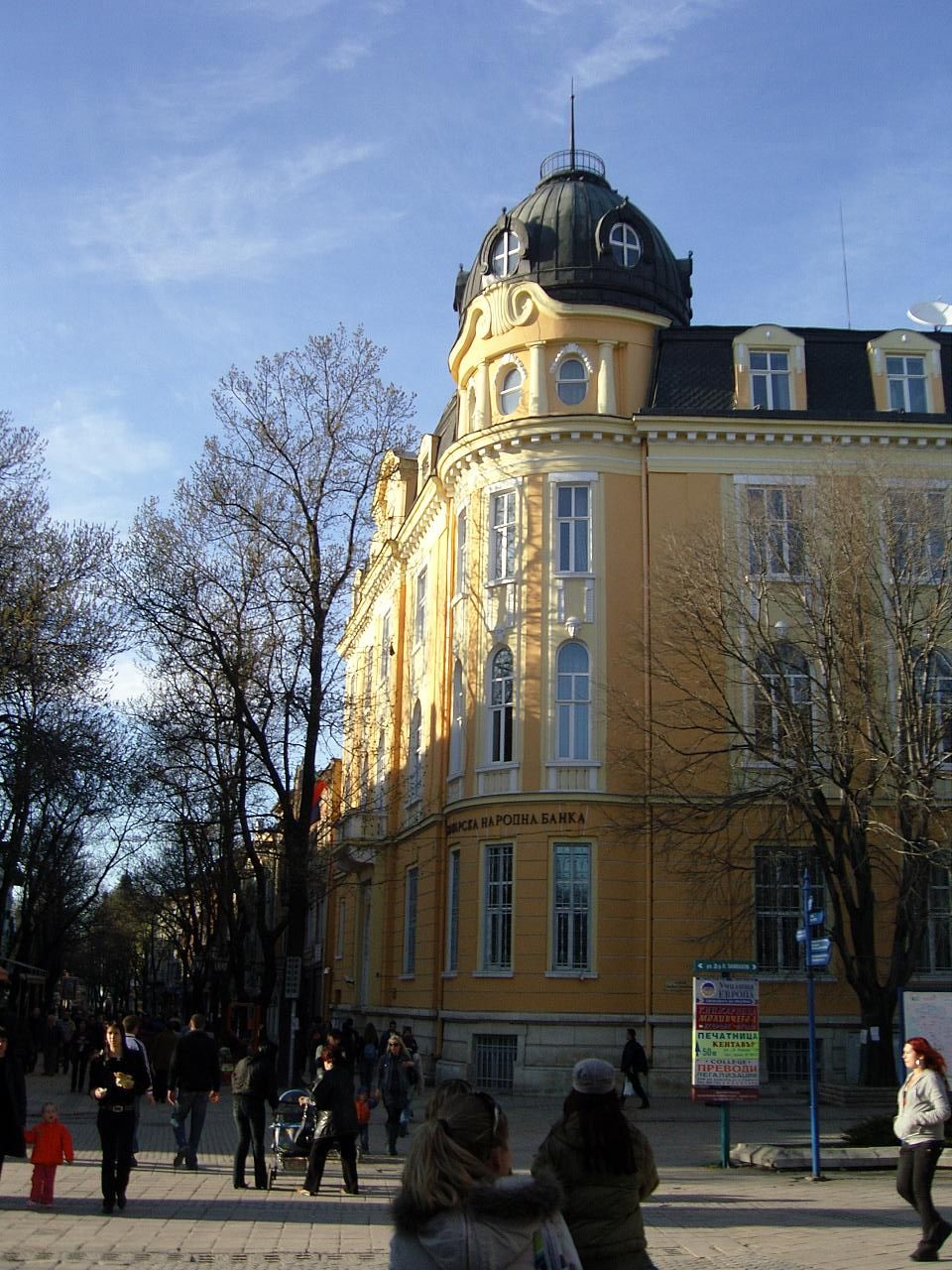|
Jacob Levy Moreno
Jacob Levy Moreno (born Iacob Levy; May 18, 1889 – May 14, 1974) was a Romanian-American psychiatrist, psychosociologist, and educator, the founder of psychodrama, and the foremost pioneer of group psychotherapy. During his lifetime, he was recognized as one of the leading social scientists. Early life and education Jacob Levy Moreno was born in Bucharest in the Kingdom of Romania. His father was Moreno Nissim Levy, a Sephardi Jewish merchant born in 1856 in Plevna in the Ottoman Empire (today Pleven, Bulgaria). Jacob's grandfather Buchis had moved to Plevna from Constantinople, where his ancestors had settled after they left Spain in 1492. It is thought that the Morenos left Plevna for Bucharest during the Russo-Turkish War of 1877–1878, following the Plevna rabbi Haim Bejarano in search of a more hospitable environment. Jacob Moreno's mother, Paulina Iancu or Wolf, was also a Sephardi Jew, born in 1873, and originated from Călăraşi, Romania. In 1895, a time of great i ... [...More Info...] [...Related Items...] OR: [Wikipedia] [Google] [Baidu] |
Bucharest
Bucharest ( , ; ro, București ) is the capital and largest city of Romania, as well as its cultural, industrial, and financial centre. It is located in the southeast of the country, on the banks of the Dâmbovița River, less than north of the Danube River and the Bulgarian border. Bucharest was first mentioned in documents in 1459. The city became the capital of Romania in 1862 and is the centre of Romanian media, culture, and art. Its architecture is a mix of historical (mostly Eclectic, but also Neoclassical and Art Nouveau), interbellum ( Bauhaus, Art Deco and Romanian Revival architecture), socialist era, and modern. In the period between the two World Wars, the city's elegant architecture and the sophistication of its elite earned Bucharest the nickname of 'Paris of the East' ( ro, Parisul Estului) or 'Little Paris' ( ro, Micul Paris). Although buildings and districts in the historic city centre were heavily damaged or destroyed by war, earthquakes, and even Nic ... [...More Info...] [...Related Items...] OR: [Wikipedia] [Google] [Baidu] |
Psychiatrist
A psychiatrist is a physician who specializes in psychiatry, the branch of medicine devoted to the diagnosis, prevention, study, and treatment of mental disorders. Psychiatrists are physicians and evaluate patients to determine whether their symptoms are the result of a physical illness, a combination of physical and mental ailments or strictly mental issues. Sometimes a psychiatrist works within a multi-disciplinary team, which may comprise Clinical psychology, clinical psychologists, Social work, social workers, Occupational therapist, occupational therapists, and Nursing, nursing staff. Psychiatrists have broad training in a Biopsychosocial model, biopsychosocial approach to the assessment and management of mental illness. As part of the clinical assessment process, psychiatrists may employ a mental status examination; a physical examination; brain imaging such as a computerized tomography, magnetic resonance imaging, or positron emission tomography scan; and blood testing. P ... [...More Info...] [...Related Items...] OR: [Wikipedia] [Google] [Baidu] |
Russo-Turkish War (1877–1878)
The Russo-Turkish War of 1877–1878 ( tr, 93 Harbi, lit=War of ’93, named for the year 1293 in the Islamic calendar; russian: Русско-турецкая война, Russko-turetskaya voyna, "Russian–Turkish war") was a conflict between the Ottoman Empire and a coalition led by the Russian Empire, and including Bulgaria, Romania, Serbia, and Montenegro. Fought in the Balkans and in the Caucasus, it originated in emerging 19th century Balkan nationalism. Additional factors included the Russian goals of recovering territorial losses endured during the Crimean War of 1853–56, re-establishing itself in the Black Sea and supporting the political movement attempting to free Balkan nations from the Ottoman Empire. The Russian-led coalition won the war, pushing the Ottomans back all the way to the gates of Constantinople, leading to the intervention of the western European great powers. As a result, Russia succeeded in claiming provinces in the Caucasus, namely Kars and Batum, a ... [...More Info...] [...Related Items...] OR: [Wikipedia] [Google] [Baidu] |
Constantinople
la, Constantinopolis ota, قسطنطينيه , alternate_name = Byzantion (earlier Greek name), Nova Roma ("New Rome"), Miklagard/Miklagarth (Old Norse), Tsargrad ( Slavic), Qustantiniya (Arabic), Basileuousa ("Queen of Cities"), Megalopolis ("the Great City"), Πόλις ("the City"), Kostantiniyye or Konstantinopolis ( Turkish) , image = Byzantine Constantinople-en.png , alt = , caption = Map of Constantinople in the Byzantine period, corresponding to the modern-day Fatih district of Istanbul , map_type = Istanbul#Turkey Marmara#Turkey , map_alt = A map of Byzantine Istanbul. , map_size = 275 , map_caption = Constantinople was founded on the former site of the Greek colony of Byzantion, which today is known as Istanbul in Turkey. , coordinates = , location = Fatih, İstanbul, Turkey , region = Marmara Region , type = Imperial city , part_of = , length = , width ... [...More Info...] [...Related Items...] OR: [Wikipedia] [Google] [Baidu] |
Bulgaria
Bulgaria (; bg, България, Bǎlgariya), officially the Republic of Bulgaria,, ) is a country in Southeast Europe. It is situated on the eastern flank of the Balkans, and is bordered by Romania to the north, Serbia and North Macedonia to the west, Greece and Turkey to the south, and the Black Sea to the east. Bulgaria covers a territory of , and is the sixteenth-largest country in Europe. Sofia is the nation's capital and largest city; other major cities are Plovdiv, Varna and Burgas. One of the earliest societies in the lands of modern-day Bulgaria was the Neolithic Karanovo culture, which dates back to 6,500 BC. In the 6th to 3rd century BC the region was a battleground for ancient Thracians, Persians, Celts and Macedonians; stability came when the Roman Empire conquered the region in AD 45. After the Roman state splintered, tribal invasions in the region resumed. Around the 6th century, these territories were settled by the early Slavs. The Bulgars, led by Asp ... [...More Info...] [...Related Items...] OR: [Wikipedia] [Google] [Baidu] |
Pleven
Pleven ( bg, Плèвен ) is the seventh most populous city in Bulgaria. Located in the northern part of the country, it is the administrative centre of Pleven Province, as well as of the subordinate Pleven municipality. It is the biggest economic center in Northwestern Bulgaria. At the 2021 census its population was 89,823. Internationally known for the siege of Plevna of 1877, it is today a major economic centre of the Bulgarian Northwest and Central North and the third largest city of Northern Bulgaria after Varna and Ruse. Name The name comes from the Slavic word ''plevnya'' ("barn") or from ''plevel'', meaning "weed", sharing the same root, and the Slavic suffix ''-en''. Geography Pleven is in an agricultural region in the middle of the Danubian Plain, the historical region of Moesia, surrounded by low limestone hills, the Pleven Heights. The city's central location in Northern Bulgaria defines its importance as a big administrative, economic, political, cultura ... [...More Info...] [...Related Items...] OR: [Wikipedia] [Google] [Baidu] |
Ottoman Empire
The Ottoman Empire, * ; is an archaic version. The definite article forms and were synonymous * and el, Оθωμανική Αυτοκρατορία, Othōmanikē Avtokratoria, label=none * info page on book at Martin Luther University) // CITED: p. 36 (PDF p. 38/338) also known as the Turkish Empire, was an empire that controlled much of Southeast Europe, Western Asia, and Northern Africa between the 14th and early 20th centuries. It was founded at the end of the 13th century in northwestern Anatolia in the town of Söğüt (modern-day Bilecik Province) by the Turkoman tribal leader Osman I. After 1354, the Ottomans crossed into Europe and, with the conquest of the Balkans, the Ottoman beylik was transformed into a transcontinental empire. The Ottomans ended the Byzantine Empire with the conquest of Constantinople in 1453 by Mehmed the Conqueror. Under the reign of Suleiman the Magnificent, the Ottoman Empire marked the peak of its power and prosperity, as well a ... [...More Info...] [...Related Items...] OR: [Wikipedia] [Google] [Baidu] |
Jewish
Jews ( he, יְהוּדִים, , ) or Jewish people are an ethnoreligious group and nation originating from the Israelites Israelite origins and kingdom: "The first act in the long drama of Jewish history is the age of the Israelites""The people of the Kingdom of Israel and the ethnic and religious group known as the Jewish people that descended from them have been subjected to a number of forced migrations in their history" and Hebrews of historical History of ancient Israel and Judah, Israel and Judah. Jewish ethnicity, nationhood, and religion are strongly interrelated, "Historically, the religious and ethnic dimensions of Jewish identity have been closely interwoven. In fact, so closely bound are they, that the traditional Jewish lexicon hardly distinguishes between the two concepts. Jewish religious practice, by definition, was observed exclusively by the Jewish people, and notions of Jewish peoplehood, nation, and community were suffused with faith in the Jewish God, ... [...More Info...] [...Related Items...] OR: [Wikipedia] [Google] [Baidu] |
Sephardi
Sephardic (or Sephardi) Jews (, ; lad, Djudíos Sefardíes), also ''Sepharadim'' , Modern Hebrew: ''Sfaradim'', Tiberian Hebrew, Tiberian: Səp̄āraddîm, also , ''Ye'hude Sepharad'', lit. "The Jews of Spain", es, Judíos sefardíes (or ), pt, Judeus sefarditas or Hispanic Jews, are a Jewish diaspora population associated with the Iberian Peninsula. The term, which is derived from the Hebrew ''Sepharad'' (), can also refer to the Mizrahi Jews of Western Asia and North Africa, who were also influenced by Sephardic law and customs. Many Iberian Jewish exiles also later sought refuge in Mizrahi Jewish communities, resulting in integration with those communities. The Jewish communities of the Iberian Peninsula prospered for centuries under the Muslim reign of Al-Andalus following the Umayyad conquest of Hispania, but their fortunes began to decline with the Christians, Christian ''Reconquista'' campaign to retake Spain. In 1492, the Alhambra Decree by the Catholic Monarchs of ... [...More Info...] [...Related Items...] OR: [Wikipedia] [Google] [Baidu] |
J L Moreno Pleven TB
J, or j, is the tenth letter in the Latin alphabet, used in the modern English alphabet, the alphabets of other western European languages and others worldwide. Its usual name in English is ''jay'' (pronounced ), with a now-uncommon variant ''jy'' ."J", ''Oxford English Dictionary,'' 2nd edition (1989) When used in the International Phonetic Alphabet for the ''y'' sound, it may be called ''yod'' or ''jod'' (pronounced or ). History The letter ''J'' used to be used as the swash letter ''I'', used for the letter I at the end of Roman numerals Roman numerals are a numeral system that originated in ancient Rome and remained the usual way of writing numbers throughout Europe well into the Late Middle Ages. Numbers are written with combinations of letters from the Latin alphabet, eac ... when following another I, as in XXIIJ or xxiij instead of XXIII or xxiii for the Roman numeral twenty-three. A distinctive usage emerged in Middle High German. Gian Giorgio Trissi ... [...More Info...] [...Related Items...] OR: [Wikipedia] [Google] [Baidu] |
Social Scientists
Social science is one of the branches of science, devoted to the study of societies and the relationships among individuals within those societies. The term was formerly used to refer to the field of sociology, the original "science of society", established in the 19th century. In addition to sociology, it now encompasses a wide array of academic disciplines, including anthropology, archaeology, economics, human geography, linguistics, management science, communication science and political science. Positivist social scientists use methods resembling those of the natural sciences as tools for understanding society, and so define science in its stricter modern sense. Interpretivist social scientists, by contrast, may use social critique or symbolic interpretation rather than constructing empirically falsifiable theories, and thus treat science in its broader sense. In modern academic practice, researchers are often eclectic, using multiple methodologies (for instance, by ... [...More Info...] [...Related Items...] OR: [Wikipedia] [Google] [Baidu] |





